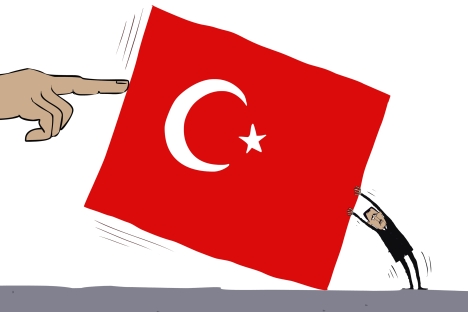Staying out of the Turkish-Syrian confrontation

Click to enlarge the image. Drawing by Sergey Yolkin.
Since the Turkish Air Force intercepted a Syrian passenger plane headed from Moscow to Damascus, there have been more than enough reasons for the two countries to commence military operations. There was, for example the Turkish fighter that was shot down by Syrian air defense and the area of Turkey that was hit by Syrian artillery. In the meantime, the flow of Syrian refugees into Turkey grows daily.
Turkish Prime Minister Recep Erdogan’s government may, at any time, appeal to the United Nations and its NATO allies to support its act of retaliation against Syria, as a form of self-defense. NATO Secretary General Anders Fogh Rasmussen has confirmed that the alliance would meet its obligations and support Turkey, in compliance with Article 5 of the North Atlantic Treaty.
The New York Times has reported that a task force of more than 150 American military specialists has been sent to Jordan, on the border Syria. Officially, they are positioned to help the government of Jordan handle the inflow of Syrian refugees – as there might be radical Islamists among them – and prepare a plan for the seizure of chemical weapons accumulated by the Syrian regime, should it ultimately fall.
If the task force consists of 150 specialists, it can mean only one thing: a military operation has been planned and approved by Washington, and will be supported in one form or another.
In this case, Moscow will find itself amongst the losers. It will lose revenue from both its supply of weapons to Damascus and its naval supply and maintenance base in Tartus. Once the Bashar al-Assad regime collapses, Moscow will have to re-build its policy in the Middle East virtually from scratch, giving up its claims to the role that the Soviet Union once played in the region.
However, this might not be anything to worry about. Unlike the U.S., Russia has few strategic interests in the Middle East. Russia does not rely on its oil, it has no large communities of Russians there, and it is not bound by close relations and obligations the way the U.S. is bound with Israel, Jordan and Saudi Arabia.
Americans, Turks and Israelis should deal with Muslim radicals and centuries-old ethnic and religious conflicts on their own – they have so many more reasons and resources to do so.
Konstantin Eggert is a commentator and host for Kommersant FM, Russia’s first 24-hour news radio station. He was a diplomatic correspondent for Russian daily Izvestia and later served as the editor-in-chief of the BBC Russian Service Moscow Bureau.
First published in Russian in Kommersant FM.
All rights reserved by Rossiyskaya Gazeta.
Subscribe
to our newsletter!
Get the week's best stories straight to your inbox

